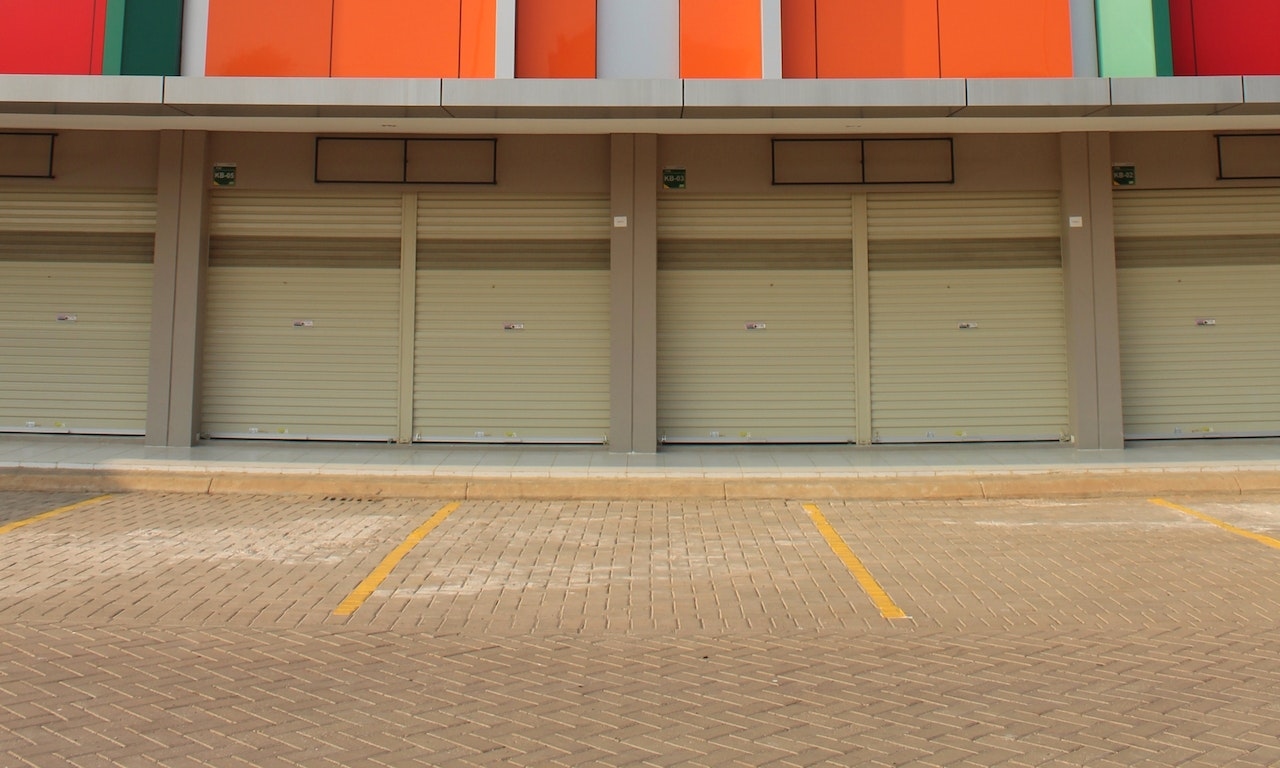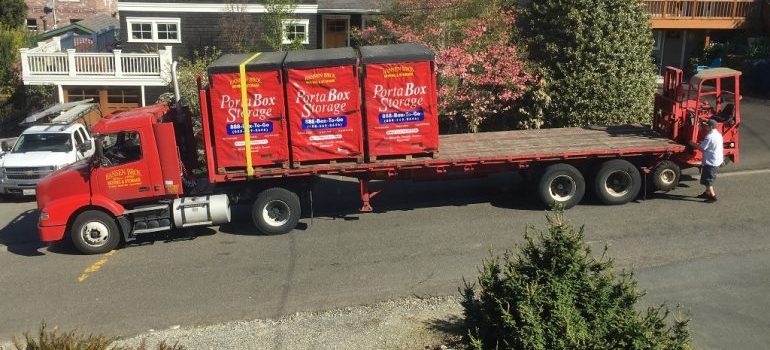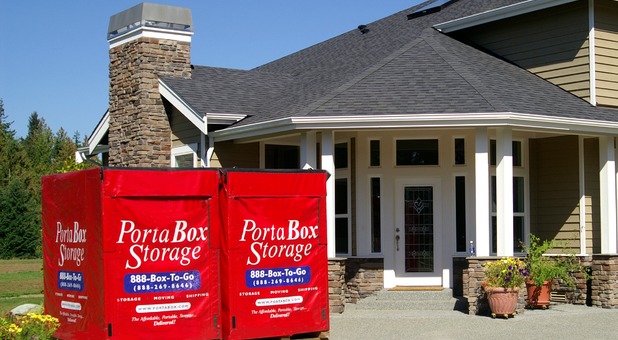The key differences between mobile and traditional storage units
get a quote
Storage units serve as off-site spaces designed to securely store belongings, offering a practical solution for individuals and businesses seeking additional storage capacity. Whether you’re downsizing, relocating, renovating, or simply needing a safe space for your excess items, storage units provide numerous benefits, including freeing up valuable space, protecting possessions from damage or theft, and offering a convenient and accessible storage solution. Two primary options exist within the storage unit landscape: mobile and traditional storage units. To help you make an informed decision, the PortaBox Storage team of experts for storage units in Lynnwood WA will examine the critical differences between mobile and traditional storage units providing insights into their unique characteristics.
Traditional storage units
Traditional storage units are fixed, stationary spaces found in self-storage facilities. These units are designed to accommodate a range of storage needs and come in various sizes. They offer secure and convenient storage solutions for individuals and businesses.
Advantages of traditional storage units include their long-established presence in the market, providing a reliable and proven storage option. These units often offer a wider range of unit sizes, allowing users to choose the space that best fits their needs. Additionally, traditional storage facilities often have on-site security measures, such as surveillance cameras and gated access, ensuring the safety of stored belongings.

However, traditional storage units also have some disadvantages. The fixed location can be inconvenient for individuals who require frequent access to their belongings. Additionally, transporting items to and from the storage facility can be time-consuming, especially if the facility is far from the user’s location. Monthly rental costs may also vary depending on the location and demand for storage units in the area. Now, let’s talk about portable storage!
Mobile storage units
Mobile storage units, or in other words portable storage containers Seattle offers, provide a flexible and convenient storage solution with their portable nature. These mobile units are delivered directly to the customer’s location and can be loaded with belongings on-site. Once filled, the storage provider transports the unit to a secure facility or the customer’s desired destination. This eliminates the need for multiple trips to a storage facility.
The advantages of mobile storage units include their convenience and time-saving benefits. Customers have the convenience of loading and unloading their belongings at their own pace without the need for additional transportation. Additionally, mobile storage units offer accessibility to stored items right at the customer’s doorstep, eliminating the need for travel to a separate storage facility.
However, a potential drawback of mobile storage units is their limited size options compared to traditional storage units. Renters may need to carefully consider the available unit sizes to ensure they meet their storage requirements. This, however, can be resolved by ordering the necessary number of portable containers, all delivered and picked up together after packing.

Evaluating storage solutions: Mobile vs. traditional units
The choice between mobile and traditional units requires a thorough understanding of their distinct features and advantages. To aid in making an informed decision, here’s a comprehensive breakdown:
- Accessibility and Convenience: Think door-to-door service versus visiting a location.
- Transportation and Moving: Imagine a storage unit coming to you instead of renting a truck.
- Security and Safety Differences: It’s about on-site guards versus sturdy locks during travel.
- Flexibility and Scalability: Choose based on how much and how often you’ll store.
- Cost Factors Differences: Every penny counts, and the costs can differ.
- Suitability for Different Use Cases: From seasonal storage to long-term treasures, which suits your needs?
With these in mind, picking the right storage becomes easy. Whether you’re storing grandma’s old chair or your winter wardrobe, there’s a solution just right for you.
Differences between mobile and traditional storage include accessibility and convenience
Accessibility and convenience play a crucial role when comparing traditional and mobile storage units, including the door-to-door storage Settle offers, which makes the whole process much easier and faster.
In terms of accessibility, traditional storage units often require customers to travel to a fixed location, which can be inconvenient and time-consuming, especially in a bustling city like Seattle. However, door-to-door storage services in Seattle offer an alternative. On-demand services bring the storage unit directly to the customer’s location, eliminating the need for travel and making the storage process much more accessible.
Furthermore, door-to-door storage in Seattle provides unmatched convenience. Customers can have the storage unit delivered right to their doorstep, allowing for easy and efficient loading and unloading of belongings. This eliminates the hassle of renting trucks or making multiple trips to a storage facility, saving valuable time and effort.
Transportation and moving considerations
Traditional storage units necessitate customers to arrange their own transportation to the facility, involving renting a moving truck or hiring professional movers to transport belongings. In contrast, mobile storage units eliminate the transportation hassle. With door-to-door delivery, the storage unit is brought directly to the customer’s location, removing the need for separate transportation arrangements.
Moving belongings into traditional storage units demands labor-intensive and time-consuming efforts. Customers must load items onto a truck, transport them to the facility, and unload them into the unit. On the other hand, mobile storage units offer a more straightforward moving process. Customers can load their belongings at their own pace without immediate transportation pressure. The storage provider takes care of transportation, either to a secure facility or directly to the desired destination, streamlining the moving process and reducing physical exertion.

Security and safety are among the key differences between mobile and traditional storage solutions
Traditional storage units provide on-site security features like surveillance cameras, gated access, and secure locks, offering protection against unauthorized access. The presence of staff members further enhances security. In contrast, mobile storage units prioritize security during transportation by employing sturdy materials and lockable doors to safeguard belongings while in transit. Some mobile storage providers go the extra mile by implementing additional security measures, such as tamper-proof seals or individual unit padlocks.
When it comes to safety, traditional storage units create a controlled environment that helps protect stored items from theft and unauthorized access. However, concerns may arise regarding potential damage caused by natural disasters or accidents within the facility.
On the other hand, mobile storage units prioritize the safety of belongings during transportation, with their design ensuring secure transit. As all who use self-storage mobile solutions know, these portable containers are kept in an equally safe nearby storage facility.
Taking into account flexibility and scalability
When comparing traditional and mobile storage units, flexibility in unit size and duration of use, as well as scalability options for changing storage needs, are important considerations. Traditional storage units offer a wide range of unit sizes and flexible rental terms, allowing customers to choose the size and duration that best suit their needs.
On the other hand, mobile storage units provide the convenience of on-site delivery and loading, though the available size options may be more limited. Both traditional and mobile storage units offer scalability, enabling customers to easily adjust their storage space as their needs change, whether through unit exchanges or transitioning to larger or smaller units. Overall, both options provide flexibility and scalability to accommodate varying storage requirements.

Differences between mobile and traditional storage regarding cost factors
When dissecting the costs associated with storage solutions, understanding the nuances between traditional and mobile units is crucial. Each type has a unique pricing structure influenced by different factors.
Budgeting for traditional storage units
- Monthly Rental Fee: The fundamental charge associated with these units is usually a monthly fee. This fee predominantly depends on the size of the unit and how long you plan to rent it.
- Administrative Fees: Upon initiation of the contract, some facilities might charge a one-time setup or administrative fee.
- Insurance: Although optional, many renters choose to insure stored items. This cost varies based on the value of belongings and coverage level.
- Additional Features: Enhanced security, climate control, or 24-hour access can escalate costs. If these features are indispensable, they should be factored into the budget.
- Location: Urban centers or high-demand areas generally have higher rental rates than more rural or less-populated regions.
Cost considerations for mobile storage units
- Delivery Fee: One of the primary differentiators is the delivery fee. The farther the delivery location, the higher this fee can be.
- Monthly Rental: Similar to traditional units, the rental cost here is influenced by unit size. But it might also consider how frequently you move the unit or request service.
- Bundled Pricing: Some companies offer package deals, combining rental, delivery, and other services into one price, often providing savings for the customer.
- Duration and Demand: Peak moving seasons or high demand can inflate prices. Similarly, longer rental durations might either offer discounts or, in contrast, higher cumulative costs.
- Additional Services: Some mobile storage providers offer packing assistance, equipment rentals, or other value-added services for an additional fee.
- Pricing Policies: It’s crucial to understand any potential penalties or promotional deals that could affect your total expenditure.
In summary, while both types of storage units have their own set of costs, understanding and comparing them based on the factors mentioned can help individuals and businesses make informed decisions, ensuring they get the best value for their money.

Suitability for different use cases
When selecting storage solutions, understanding specific use cases helps pinpoint the best options.
Traditional storage units
- Long-term Needs: These units shine for items that aren’t accessed regularly.
- Stability and Safety: A consistent environment is key for reducing damage over extended periods.
- Special Features: Climate control in many units benefits items sensitive to temperature fluctuations.
- Consistent Storage: Businesses with a constant need, like document archiving or inventory, will find these units most apt.
For instance, antique collectors often turn to traditional storage units to safeguard their invaluable items. Similarly, businesses, especially those with a need for document retention, such as legal firms or corporations, often rely on these units to archive crucial contractual paperwork.
Mobile storage units
- Flexibility: Their adaptability to evolving requirements is a standout feature.
- On-site Access: With delivery to your preferred location, access to items becomes hassle-free.
- Short-term Solutions: They cater to transient storage needs with efficiency.
- Scalable: Their capacity can adapt based on the storage volume, ensuring flexibility for unforeseen demands.
For example, homeowners embarking on renovation projects find mobile storage units invaluable. Not only do they provide easy access to their belongings, but they also avoid cluttering other parts of their home. Similarly, event organizers lean on these units, especially during large-scale events. With equipment, props, and supplies to store, mobile units placed on the event site streamline operations and ensure that everything is on hand when needed.
Making the right choice when evaluating differences between mobile and traditional storage hinges on understanding these unique benefits and aligning them with individual requirements.

Future trends
As we look towards the future, the storage industry is likely to continue evolving, with advancements in technology and innovative solutions expected to shape the landscape. From automated systems and enhanced security features to streamlined processes and eco-friendly initiatives, the future outlook for storage options appears promising, offering even more convenience and efficiency for individuals and businesses seeking reliable storage solutions.
The storage verdict: Portable or traditional?
As you can see, both traditional and mobile units present their own set of advantages and limitations. Traditional storage facilities offer the assurance of stable environments, often coupled with robust storage security measures, making them an attractive option for those seeking long-term or specialized storage. Conversely, mobile units stand out with their unmatched flexibility, accessibility, and convenience, which is particularly beneficial for short-term or transitional phases.
Ultimately, the decision boils down to individual needs and circumstances. Whether you prioritize the ease of having a unit delivered to your doorstep or value the consistency of a fixed facility, understanding these key differences ensures an informed and optimal choice. As the demand for storage continues to grow, both in business and personal spheres, the distinction between these two prominent options becomes ever more essential. So, weigh the differences between mobile and traditional storage options, and you can confidently select the storage solution that best aligns with your goals.
